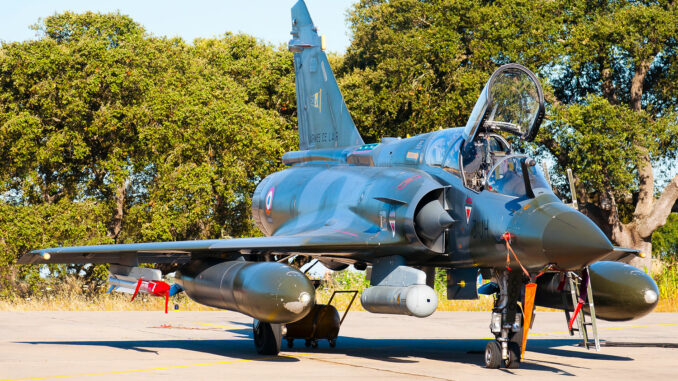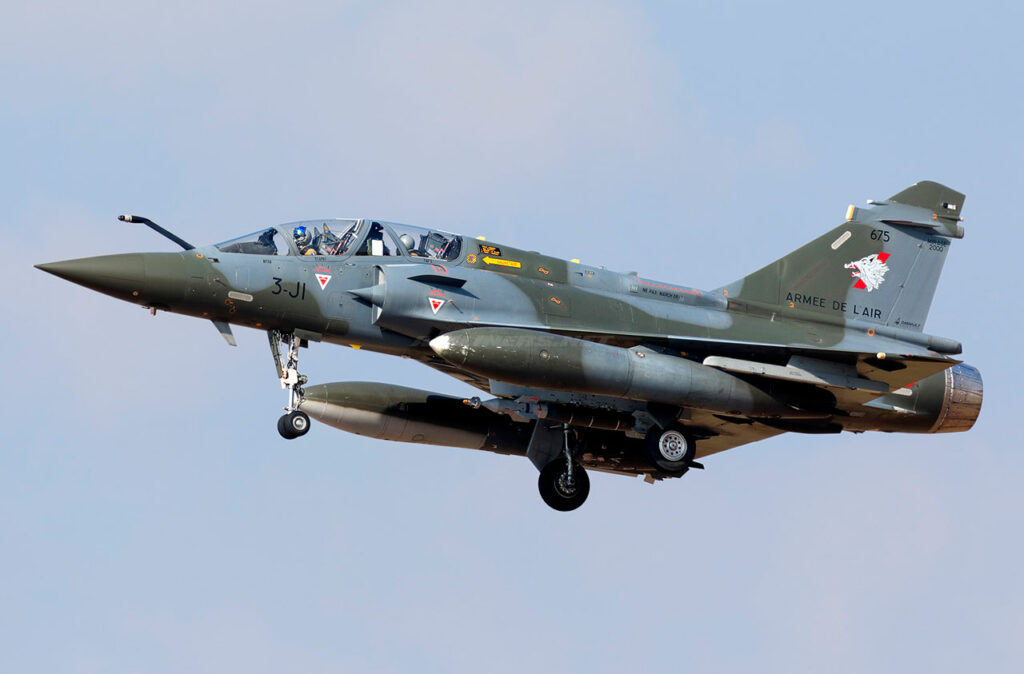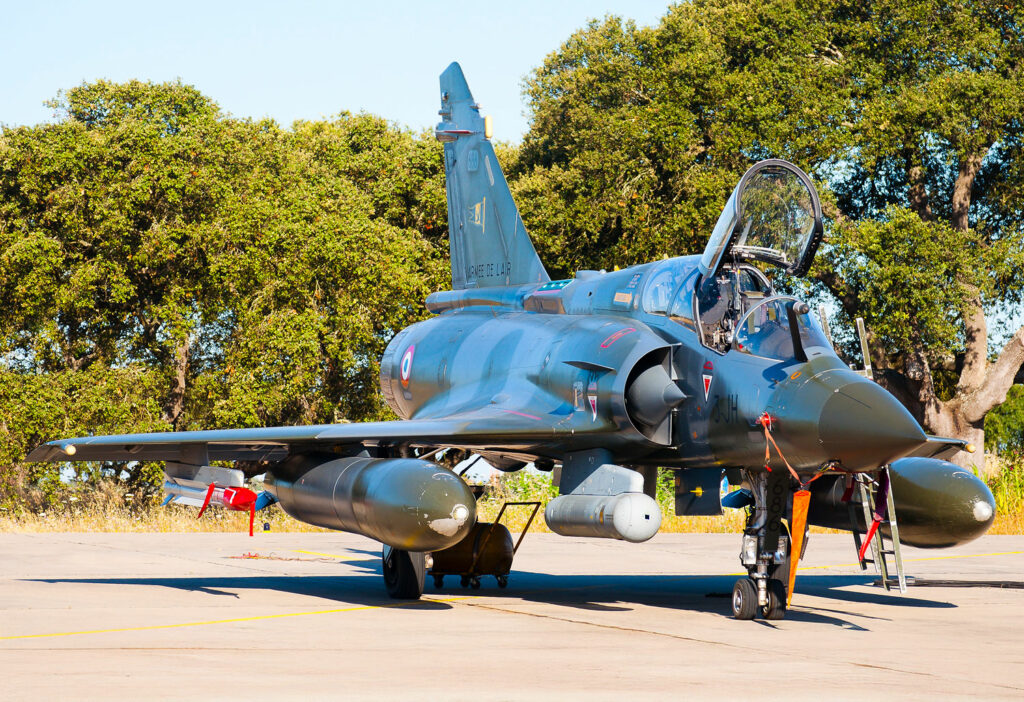
Technical analysis of the French withdrawal and its strategic implications in Central Africa.
The withdrawal of France’s Mirage 2000Ds from Chad marks the end of more than three decades of French military presence in the country. The first two aircraft left N’Djaména for Nancy Ochey, symbolizing the beginning of the disengagement from Operation Épervier, initiated in 1986. The withdrawal is seen as a serene development in Franco-Chadian relations, allowing Chad to regain full military sovereignty. However, the decision has strategic implications for regional security and bilateral partnerships, while highlighting the dynamics of Françafrique and the current geopolitical stakes in Central Africa.
Mirage 2000D withdrawal from Chad
The withdrawal of France’s Mirage 2000Ds from Chad represents a significant milestone in military relations between the two nations. Since February 1986, France had maintained an active military presence in Chad through Operation Épervier, aimed at stabilizing the country and protecting its strategic interests in Central Africa. The departure of the first two Dassault Aviation Mirage 2000D ground attack and penetration aircraft from N’Djaména to Base Aérienne 133 in Nancy Ochey in December 2024 symbolizes the start of a gradual withdrawal.
The Mirage 2000Ds, multi-purpose combat aircraft, have played a crucial role in surveillance and support operations for the Chadian armed forces. Their departure marks the end of an era of intense military cooperation, initiated during the Cold War and reinforced by subsequent alliances. This disengagement is seen as a response to geopolitical changes, with France reorienting its military priorities towards other regions of the world.
The departure of the Mirage 2000D is also a sign of the evolution of Franco-Chadian relations. After decades of military cooperation, Chad is regaining full military sovereignty, while maintaining partnerships in other areas such as culture and environmental development. This transition is taking place in a climate of serenity and mutual respect, unlike other French disengagements in more unstable countries such as Burkina Faso and Mali.
The departure of the aircraft was welcomed by senior Chadian military authorities, underlining the continuing cooperation despite the withdrawal of the French air force. This move reflects a desire to strengthen bilateral relations without military dependence, favoring cooperation based on common interests rather than an imposed military presence.
In conclusion, the withdrawal of the Mirage 2000D from Chad marks a strategic evolution in Franco-Chadian relations, putting an end to a prolonged military presence while paving the way for new forms of cooperation and partnership between the two countries. This decision is part of a wider process of reorienting French military strategies and redefining alliances in Central Africa.

History of the French military presence in Chad
The French military presence in Chad is part of a historical context marked by Françafrique, a policy designed to maintain French influence in post-colonial Africa. Since February 1986, France has led Opération Épervier, a military mission to stabilize Chad in the face of internal conflict and regional threats. This operation was essential to protect French interests, notably natural resources and strategic routes in Central Africa.
The Mirage 2000D, deployed in Chad, played a central role in surveillance, reconnaissance and support operations for the Chadian armed forces. These aircraft have been used to intercept potential threats, support peacekeeping missions and ensure the security of French interests in the region. Their presence has contributed to Chad’s relative stability, despite persistent ethnic and political tensions.
Over the years, the French presence in Chad has evolved in response to geopolitical changes and security challenges. The 1990s and 2000s were marked by ad hoc interventions in response to crises, such as support for governments in power and the fight against rebel groups. Military cooperation also included training, technological exchanges and strategic partnerships, strengthening the capabilities of Chad’s armed forces.
However, Franco-Chadian relations have also been marred by accusations of corruption, nepotism and political manipulation, typical of the dynamics of Françafrique. These tensions have sometimes led to readjustments in French military policy, influencing the level and nature of the French presence in Chad.
The gradual disengagement, initiated by the withdrawal of Mirage 2000Ds in December 2024, is part of a drive to refocus French military efforts on other regions deemed to be a priority. This withdrawal marks the end of a period of intensive military cooperation, allowing Chad to regain full sovereignty in defense matters. This transition is facilitated by the relative stabilization of the country and a desire to strengthen non-military partnerships with France, based on shared economic and cultural interests.
In short, the French military presence in Chad has been a key component of France’s strategy in Central Africa, influenced by the dynamics of Françafrique and regional geopolitical issues. The withdrawal of the Mirage 2000D marks a major change in this relationship, paving the way for a new phase of bilateral cooperation.
Mirage 2000D: technical specifications and operational role
The Dassault Aviation Mirage 2000D is a multirole fighter aircraft, widely used by the French Air Force. Designed in the 1980s, the Mirage 2000D is a variant of the Mirage 2000 dedicated to ground attack and penetration missions. Its design is based on a combination of advanced technologies and operational capabilities tailored to the requirements of modern missions.
Technically, the Mirage 2000D is equipped with a powerful turbofan engine, enabling it to reach a maximum speed of over 2,100 km/h and an optimum cruising altitude of 12,000 meters. Its armament includes a variety of air-to-ground missiles, guided bombs and integrated cannons, offering great flexibility to attack multiple targets with precision. In addition, it is equipped with advanced navigation systems, surveillance radars and secure communications systems, ensuring effective coordination during military operations.
The Mirage 2000D’s operational role in Chad included aerial surveillance, strategic reconnaissance and support to ground forces. By intercepting potential threats and providing crucial information to commanders on the ground, these aircraft helped maintain security and stability in a region often prone to tension and conflict. Their ability to carry out long-range missions and operate in hostile environments has been essential to the success of French operations in Chad.
Mirage 2000Ds have also played a role in joint military exercises with the Chadian armed forces, strengthening local defense capabilities and promoting skills transfer. These collaborations have improved the resilience of Chadian forces in the face of regional threats, while consolidating military ties between France and Chad.
However, with the evolution of military threats and technologies, the Mirage 2000D has gradually been replaced by more modern and sophisticated platforms. The withdrawal of the last Mirage 2000Ds from Chad in December 2024 marks the end of their operational service in the region, symbolizing a transition to new defense strategies and international cooperation.
The consequences of the withdrawal for regional security
The withdrawal of France’s Mirage 2000Ds from Chad has significant consequences for regional security in Central Africa. This decision marks the end of a long-standing French military presence, leaving Chad to regain full control of its national defense. There are several implications for both Chad and the security balance in the region.
Firstly, the absence of the Mirage 2000D reduces Chad’s air defense capability against external threats. Although the country has its own armed forces, cooperation with France has provided valuable technological support and expertise in managing military and terrorist threats. Without this support, Chad will have to invest further in strengthening its air and military capabilities to maintain internal stability and meet regional security challenges.
Secondly, France’s withdrawal could influence the dynamics of Chad’s regional alliances and international relations. France has historically played a central role in African affairs, and its withdrawal could encourage other foreign powers to strengthen their presence in Chad. Countries such as Russia and China could seize this opportunity to establish new military and economic partnerships, thereby altering the balance of geopolitical influence in the region.
What’s more, the absence of Mirage 2000Ds could affect collaborative security operations between Chad and its neighbors. Military cooperation and information exchanges with France have contributed to the fight against rebel groups and terrorist networks. Without this partnership, Chad will have to strengthen its alliances with other nations and regional organizations to maintain effective vigilance against security threats.
The French withdrawal may also have an impact on Chad’s ability to respond rapidly to crises. The Mirage 2000Ds, with their rapid response and operational range, have enabled a rapid and effective response to military incidents. Their absence could slow down Chad’s ability to respond to sudden attacks or emergency situations, necessitating a restructuring of defense strategies and intervention protocols.
In addition, the withdrawal of the French air force could influence the perception of security among the Chadian population. Foreign military presence has often been seen as a stabilizing factor, contributing to confidence in government institutions. The absence of this presence could raise concerns about national security and the government’s ability to effectively protect its citizens and interests.
In economic terms, the withdrawal of the Mirage 2000D could also affect trade relations and foreign investment. France’s military presence has often been associated with economic opportunities, facilitating investment in strategic sectors such as energy and infrastructure. Their withdrawal could slow down certain economic projects, although it would also open up opportunities for new international investors.
Finally, withdrawal could encourage Chad to modernize its armed forces and invest in new defense technologies. This could include the acquisition of new combat aircraft, the development of autonomous air surveillance capabilities and the integration of advanced technologies to strengthen national defense. This transition to greater military autonomy could ultimately strengthen Chad’s resilience to security threats and contribute to lasting stability in the region.

Implications for Franco-Chadian relations
The withdrawal of France’s Mirage 2000Ds from Chad has profound implications for bilateral relations between the two countries. This decision marks a significant evolution in the dynamics of military cooperation, and influences various aspects of Franco-Chadian diplomatic, economic and cultural relations.
Historically, France and Chad have enjoyed close relations, often defined by the French military presence and strategic alliances within the framework of Françafrique. Operation Épervier, underway since 1986, has been a cornerstone of this relationship, aimed at stabilizing Chad and protecting French interests in Central Africa. The withdrawal of the Mirage 2000Ds symbolizes the end of an era of intensive military cooperation, and paves the way for a redefinition of bilateral relations.
Diplomatically, the withdrawal enables both nations to redirect their cooperation towards non-military areas, such as culture, economic development and the environment. The presence of the Chadian general at the departure of the planes testifies to a mutual respect and a desire to maintain strong ties despite the military disengagement. This transition could foster a more balanced and mutually beneficial collaboration, where France could continue to play an important role in Chad’s development without direct military intervention.
Economically, the withdrawal could encourage a restructuring of partnerships between France and Chad. France could focus on investments in sectors such as energy, infrastructure and green technologies, thereby supporting Chad’s economic growth while diversifying its economic interests in Central Africa. Chad, for its part, could seek to attract new foreign investment to fill the void left by France’s military disengagement, fostering a more self-sufficient and resilient economy.
On the cultural front, France and Chad could strengthen their exchanges in the fields of education, art and science. Joint initiatives in these sectors could contribute to greater mutual understanding and harmonious cultural development, enriching bilateral relations beyond the military and economic spheres.
However, this withdrawal is not without its challenges. Military disengagement could be perceived as a diminution of French influence in Chad, potentially opening the door to increased influence from other foreign powers such as China or Russia. These countries could seek to strengthen their partnerships with Chad, offering economic aid and trade agreements to compensate for the French withdrawal. This development could alter the balance of geopolitical influence in the region, with consequences for future alliances and partnerships.
In addition, Chad will have to adapt to a new security reality without French air support. While bilateral relations may strengthen in other areas, Chad will need to invest more in its own military capabilities and in strengthening its regional alliances to maintain domestic security and stability.
Ultimately, the withdrawal of the Mirage 2000D from Chad paves the way for a new phase in Franco-Chadian relations, based on renewed cooperation and strategic collaboration in a variety of fields. This development testifies to the adaptability of both nations in the face of geopolitical change and new security challenges, strengthening bilateral ties while redefining military and economic priorities for the future.
War Wings Daily is an independant magazine.